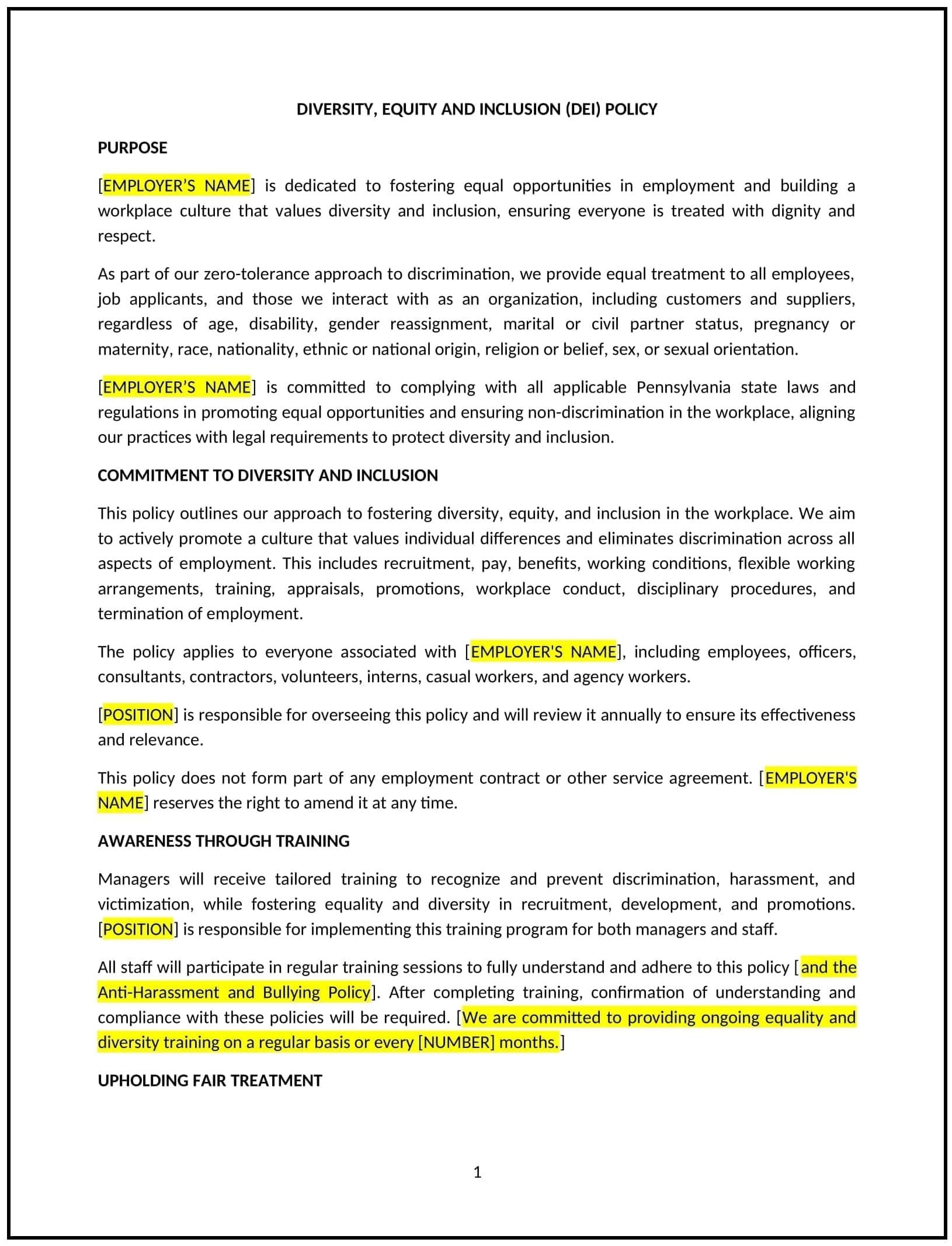Diversity, equity and inclusion (DEI) policy (Pennsylvania): Free template
Got contracts to review? While you're here for policies, let Cobrief make contract review effortless—start your free review now.

Customize this template for free
Diversity, equity and inclusion (DEI) policy (Pennsylvania)
This diversity, equity, and inclusion (DEI) policy is designed to help businesses in Pennsylvania create a workplace that values and promotes diversity, ensures equity, and fosters inclusion. Whether managing a small business or a large organization, this template provides guidelines for embedding DEI principles into hiring, management, and day-to-day operations while aligning with Pennsylvania labor laws and federal anti-discrimination regulations.
By using this template, businesses can enhance workplace culture, support employee engagement, and build stronger connections with Pennsylvania’s diverse communities.
How to use this diversity, equity and inclusion (DEI) policy (Pennsylvania)
- Define DEI principles: Clearly outline the organization’s commitment to diversity, equity, and inclusion, including how these values align with the business’s mission and goals.
- Address recruitment practices: Include guidelines for recruiting and hiring diverse talent, ensuring equal opportunities for all candidates.
- Promote inclusive management: Detail how managers can create equitable opportunities for employee development, promotion, and participation in decision-making.
- Encourage ongoing education: Provide steps for implementing DEI training programs to increase awareness and understanding of unconscious bias and inclusive behaviors.
- Reflect Pennsylvania-specific considerations: Tailor the policy to Pennsylvania’s diverse demographics, workforce needs, and industry dynamics.
Benefits of using a diversity, equity and inclusion (DEI) policy (Pennsylvania)
A well-structured DEI policy supports employee engagement and workplace culture. Here's how it helps:
- Promotes inclusivity: Encourages a workplace culture where all employees feel valued and respected, regardless of their background.
- Enhances recruitment: Attracts a broader pool of talent by demonstrating the organization’s commitment to diversity and equity.
- Reduces workplace bias: Provides clear guidance on reducing biases in decision-making, hiring, and promotion practices.
- Supports compliance: Aligns with Pennsylvania labor laws and federal anti-discrimination regulations, minimizing legal risks.
- Strengthens community ties: Reflects the values of Pennsylvania’s diverse communities, fostering stronger relationships with customers and stakeholders.
Tips for using a diversity, equity and inclusion (DEI) policy (Pennsylvania)
- Communicate DEI values: Share the policy with employees and stakeholders to ensure everyone understands and supports the organization’s commitment to DEI.
- Provide training: Offer regular DEI training for employees and managers to build awareness and foster inclusive practices.
- Monitor progress: Establish metrics to track the organization’s DEI efforts and regularly review progress to identify areas for improvement.
- Celebrate diversity: Organize events or initiatives that recognize and celebrate diversity within the workplace and local community.
- Review periodically: Update the policy to reflect changes in Pennsylvania demographics, labor laws, or organizational goals.